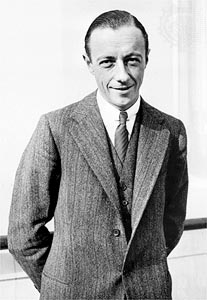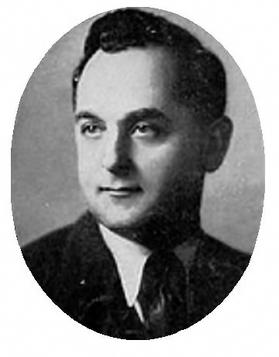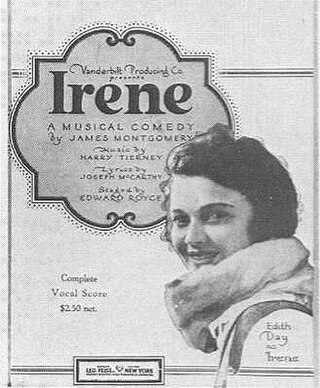This article needs additional citations for verification .(September 2023) |
Harold Dixon was an American composer, lyricist and publisher. [1]
This article needs additional citations for verification .(September 2023) |
Harold Dixon was an American composer, lyricist and publisher. [1]
"Gunga Din" is an 1890 poem by Rudyard Kipling set in British India. The poem was published alongside "Mandalay" and "Danny Deever" in the collection "Barrack-Room Ballads".
This is a list of notable events in music that took place in the year 1918.

Jean Schwartz was a Hungarian-born Jewish American composer and pianist. He is best known for his work writing the scores for more than 30 Broadway musicals, and for his creation of more than 1,000 popular songs with the lyricist William Jerome. Schwartz and Jerome also performed together on the vaudeville stage in the United States; sometimes in collaboration with Maude Nugent, Jerome's wife, and the Dolly Sisters. Schwartz was married to Jenny Dolly from 1913 to 1921.

Walter Donaldson was a prolific American popular songwriter and publishing company founder, composing many hit songs of the 1910s to 1940s, that have become standards and form part of the Great American Songbook.

Gustav Gerson Kahn was an American lyricist who contributed a number of songs to the Great American Songbook, including "Pretty Baby", "Ain't We Got Fun?", "Carolina in the Morning", "Toot, Toot, Tootsie ", "My Buddy" "I'll See You in My Dreams", "It Had to Be You", "Yes Sir, That's My Baby", "Love Me or Leave Me", "Makin' Whoopee", "My Baby Just Cares for Me", "I'm Through with Love", "Dream a Little Dream of Me" and "You Stepped Out of a Dream".

Vincent Millie Youmans was an American Broadway composer and producer.

Milton Ager was an American composer, regarded as one of the top songwriters of the 1920s and 1930s. His most lasting compositions include "Ain't She Sweet” and “Happy Days Are Here Again”.

The Barrack-Room Ballads are a series of songs and poems by Rudyard Kipling, dealing with the late-Victorian British Army and mostly written in a vernacular dialect. The series contains some of Kipling's best-known works, including the poems "Gunga Din", "Tommy", "Mandalay", and "Danny Deever", helping consolidate his early fame as a poet.

Thomas Joseph McCarthy was an American lyricist whose most famous songs include "You Made Me Love You", and "I'm Always Chasing Rainbows", from the now-forgotten Oh, Look! (1918), starring the Dolly Sisters, based upon the haunting melody from the middle section of Chopin's Fantaisie-Impromptu.

Henry Arthur Barrows was an American actor who appeared in films from 1913 to 1936.

Montagu Love was an English screen, stage and vaudeville actor.
Maceo Pinkard was an American composer, lyricist, and music publisher. Among his compositions is "Sweet Georgia Brown", a popular standard for decades after its composition and famous as the theme of the Harlem Globetrotters basketball team.

Bombo is a Broadway musical with a book and lyrics by Harold Atteridge and music by Sigmund Romberg.
Raymond A. Sherwood was an American lyricist of popular music of the Tin Pan Alley genre. Sherwood's World War I Draft Registration indicates that in June 1917, he worked as a salesman for Forster Music Publisher, Inc. Forster, based in Chicago, at that time had an office at 116 West 42nd Street in Manhattan.

A. J. Stasny Music Co. was an American publisher of popular sheet music. The firm was chartered as a New York corporation in 1922 by Betty "Bessie" Stastny (née Fisher) (1882–1974) and her husband, Anthony John Stastny (1885–1923), and M. Kerr – although, there was music published from as early as 1908 bearing the name A. J. Stasny Music Co. Cleveland, Ohio. A. J. Stasny and his wife had moved from Cleveland to New York in 1910. The New York firm was based out of the Tin Pan Alley district of Manhattan, New York. By 1920, the firm had grown into one of the largest music publishing companies in the country with branch offices in 18 large cities, including Philadelphia, Chicago, San Francisco, and London – with over 200 employees and grossing over one million dollars a year.
Bert L. Rule(néAlbert Lyman Rule; 12 August 1891 Brooklyn; – 17 August 1978 East Patchogue, New York) was an American composer, arranger, singer, and pianist of popular songs of Tin Pan Alley and the vaudeville genre. Rule composed and published his music, some of which became national hits, from 1913 to 1934. He worked in publishing houses, namely M. Witmark & Sons and performed in vaudeville theaters throughout the country roughly during the same period.
Harry David Kerr was an American songwriter, lyricist, author, and lawyer. Kerr became active in music at age 15 (1895). The practice of law had been his prime avocation until 1920, when he decided to focus on songwriting. But he still continued to use his legal training in music. In 1922, while living in New York City, Kerr prepared the incorporation documents for the American Society of Composers, Authors and Publishers (ASCAP), of which he had become one of 90 charter members at its founding in 1914.